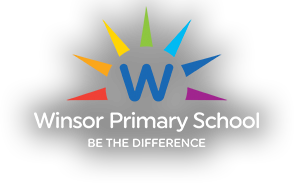Computing
At Winsor we aim to ensure that ALL children have the opportunity to develop their understanding in all areas of Computing: Digital Literacy, ICT and Computer Science.
"Computers are incredibly fast, accurate and stupid; humans are incredibly slow, inaccurate and brilliant; together they are powerful beyond imagination.”
Albert Einstein
Our curriculum aims to ensure that all pupils can understand and apply the most important principles and concepts of computer science, including abstraction, logic, algorithms and data representation and be able to transfer these skills into other areas of the curriculum.
It gives children the necessary skills to break down a problem, predict what will happen and use logic to find a solution through practical experiences.
Computer Science
All year groups have discreet computing lessons where they learn to design, write and debug programs that accomplish specific goals.
We believe that teaching our children to code helps them to develop their ability to think logically, predict and reason.
As they progress through school, the children will develop their programming skills learning to:
- control and simulate physical systems
- solve problems by decomposing them into smaller parts
- use sequence , selection and repetition in programs
- work with variables and various forms of input and output
- detect and correct errors in algorithms and programs
Information Technology
Technology is very much a part of our everyday lives and the internet offers us all amazing opportunities for communication and collaboration.
At Winsor Primary School, we teach our children to understand how internet services work and how to stay safe online in a safe, responsible and respectable manner.
Digital Literacy
As part of the computing curriculum, our children are encouraged to be creative and exploratory, using technology purposefully to make a range of digital content. We integrate digital learning as much as possible through any areas of the curriculum.
Examples:
Films, animations, digital books, posters, blogs, presentations and 3D models using a wide range of software and a variety of hardware including iPads, desktops, beebots and probots.
We recommend that parents use the following online resources that can be accessed from home:
School ID | mgp3
Bug Club is a powerful whole school reading programme that is proven to raise attainment in reading. It brilliantly combines stunning books and an incredible online reading world, offering an enormous variety of styles, and genres, and characters, to hook children into a lifelong love of books and develop confident young readers.
Every child at Winsor School, from Year 1 to Year 6, has their own username for the maths site ttsrockstars.
Times Tables Rock Stars is a carefully sequenced programme of daily times tables practice. Each week concentrates on a different times table, with a recommended consolidation week for rehearsing the tables that have recently been practised every third week or so.
Google Classroom
Winsor Primary School uses Google Classroom which is fully integrated into our teaching and learning. We share useful web links, assignments, video links and snapshots of class learning. There are also opportunities for children to leave comments.
Every child has been given a Winsor Primary Google username and password; speak to us if you are unsure of these. Sign in using the Google Chrome browser or you can also access it from an iPad or Android tablet by downloading the Google Classroom app.
Online Safety
Online safety is an important part of keeping children safe at Winsor Primary School.
We have extensive security measures in place in school, which are monitored both internally and externally, to help safeguard pupils from potential dangers or unsuitable material. Children are taught the fundamental concepts of staying safe online with quality lessons at the start of each term and are embedded throughout the Computing Curriculum. Lessons are taught and assessed using Cyberpass (a resource by lgfl) and Hector's World (an online resource aimed at KS1). Any Online Safety incidents are recorded and managed.
We can only be successful in keeping children safe online if we work with parents to ensure the Online-Safety message is consistent. It is important that parents speak to their children about how they can keep safe and behave appropriately online.
Click on the links for more:
Online safety fact sheet and
What parents need to know about radicalisation.
Below is a link to the computing overview for Y1-Y6. Please note that this is currently being updated.

